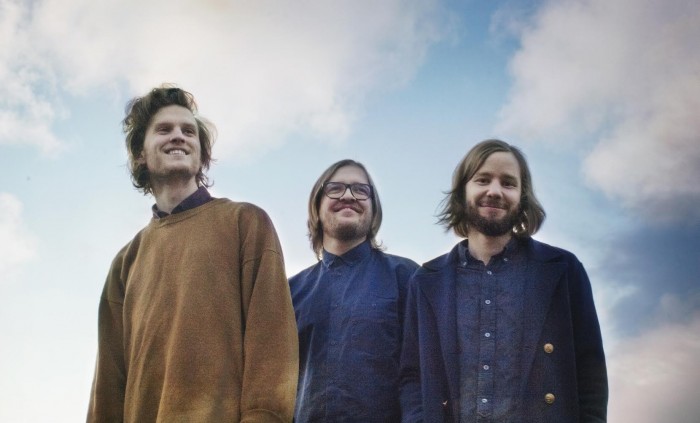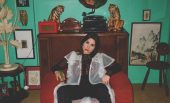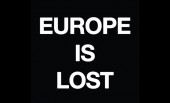Our resident expert in all things new ‘n’ Nordic, Derval McCloat, recently spent some time with the tremendously talented and uber-friendly Norwegian band Gold Celeste – creators of The Glow, one of our favourite albums of last year. You can read part one of this extensive interview, in which the band talk in detail about how they came together, their musical backgrounds and myriad influences, here, or tuck straight into the final part below. Take it away, Derv…
First a quick personnel check: Gold Celeste is Simen Hallset (lyrics/vocals/bass), Petter Haugen Andersen (percussion), and Eirik Fidjeland (vocals/synths/guitars – various /pedals/harp/cats). Touring guitar player Torstein Kvamme Holum was also included in the interview line-up!
Secondly, let me remind you of, or, acquaint you with, the reason we’re here in the first place – music – via one of my favourite Gold Celeste tracks, ‘Time of Your Life’ (this song is what the word “uplifting” was invented for):
Simen Hallset: Really early on, we recorded one song that we put up on the internet. I think I knew Arne [Slomann Johannessen] from Riot Factory even before we started [former incarnation] Angelica’s Elegy, because his brother, Conor Patrick (of The Shooting Tsar Orchestra fame), was the guy who owned the studio we moved into right after we left the Folk High School. They’re from Trondheim [well, actually one of them was born in Ireland but that’s another day’s interview! – Derv]. Conor Patrick talked about creating a home label and then both he and Arne said “Why don’t we do the work for you? Let’s have a collaboration.” And that’s how it started.
It’s been one synergetic collab for sure. Let’s talk about the Gold Celeste debut album, The Glow. You said it took you two years to complete it. Why did it take so long?
Petter Haugen Andersen: As an innocent bystander I would say that you, Simen and Eirik spent at least one year just writing a lot of songs, then making sketches, trying to get where you were going. Just trying to find that sound. Also a lot of songwriting was done in the studio; there’d be like one song, we’d record it, then make some changes, because it always changes until you get to that point where you’re satisfied with it.
Simen: Or you end up with something completely different, as it’s sometimes just a hassle to pick up where you left off. I guess we had at least 40 sketches recorded, you know, these 30 second bits, and I think we made it kind of hard to continue …”
Eirik Fidjeland: You know, you fall in love with those sketches. You can never really recreate the energy and spontaneous feel.
You know it’s funny you should say that. Did you ever hear of a British band called Talk Talk?
Unanimous: Yeah/Yes/Yup.
Mark Hollis, the lead singer, always maintained that when he went into the studio and tried to play a sketch for the second time it had lost an energy it had the first time around, so when TT were making their later albums, everything was recorded off live takes.
Simen: Yeah, we’ve been privileged to have been able record constantly in the studio. We’ve had the chance to record and make this perfect 30-second thing, and then, you know, (laughs) you can’t go on from there. I think if you hear The Glow with that in your mind, you might hear some instrumental parts that kind of come out of the blue.
So what do you do with all these 30-second “things”?
Simen: You know, that’s why we like a lot of hip-hop music as well, because you know they listen to thousands of records from which they find these small bits that are pure gold, and they’ll try to create something new out of them. At least the kind of people we like to listen to, they’ve found these nuggets that are just perfect, and perhaps we’ve kind of had that mentality as well. Everything, every ten, fifteen seconds has to stand out on its own almost. But I think that might be an ideal that you can’t live up to all the time. Luckily, I think we’ve learned to relax a little.
Petter: But it’s also nice to have that archive of ideas, because when suddenly you’re in the studio and you’re jamming, you have a new thing and suddenly it’s like “Wow” – this matches perfectly with that other thing and suddenly there’s the song, you know, you can piece it together later, you just keep all the pieces…
Simen: Yeah, I think if you hear The Glow with that in your mind, you might hear some instrumental parts that kind of come out of the blue.
Simen, do you do all your own backing vocals or do you share backing vocal duties with Eirik?
Eirik Fidjeland: It depends on whether you mean live or on the record? If you mean live, I do a lot of backing vocals, but if you mean the record, well, I do some of the backing vocals but mainly it’s Simen.
Simen: It’s efficient, and after spending many hours recording my own voice alone, making sketches, it’s a fluent process to some extent.
Makes sense. Is it difficult to be objective when you’re producing your own music?
Simen: Should you be objective when you make music? I don’t know? I think it’s kind of soul-wrenching at times… I can make a sketch and send it to the guys, and love it myself, and then if I don’t get a reply within an hour, I think, oh jeez, what have I done? Is this total crap? You need some kind of confirmation from your bandmates.
Petter: It’s easier being two or three than being just one person doing all the work, and I really think that the trick is not spending too much time with every iteration of a song, or every part. If you’re banging your head against a wall, just do something else and forget about it and then you can go back to it with fresh ears and try to pick out what is good or bad. It’s tiresome sometimes too. It just gets worse every time [you go back to it].
Simen: I think that we’re unique. We’ve been accustomed to having total control over every aspect up to the final result. I think a lot of music stems from introverted personalities you know, the ones that can sit down and try to come up with something personal and refreshing.
Yeah but how does an introverted personality cope with being on stage?
Simen: I think we’re all balanced out as well, so we’re not, you know, anxious and socially alienated. So there’s the feeling of being surrounded by a support network rather than that of standing there by yourself.
Petter: Yeah but it’s also that the music we play isn’t that showy, so we don’t have to like be this kind of, I don’t know …
You mean you don’t have to do the big full lead man jumping around the place thing?
Petter: Yeah, we don’t need to be shouting.
Simen: I can guarantee you I’ll be jumping around [during tonight’s show]”
Simen: I think that varies.
Petter: We do a lot of recording when we practice and when we’re jamming, just bits. Simen for example, will pick something out of there and make a sketch based on the things we’ve played, or else something completely fresh.
Simen: We play a lot together, jam out, and then we perhaps individually process it and try to create something out of the idea and before it’s finished we try to review it together. That’s at least how The Glow was created I think.
Petter: And when you’re mixing it yourself you’re not limited to what you’ve done. The song isn’t finished until you know the lyrics are finished.
Simen: Yeah I think me and Eirik also often work in parallel to each other. Some songs on the album I’ve written and some songs Eirik has written. We put them together but I don’t think we have this very conscious way of how we, you know… I don’t think everything has to be 50/50. If one of us has an idea or a part, I think it should be separate from us as people, as a music piece hopefully. We haven’t talked a lot about that aspect, we just make music and try to be honest with each other. I wouldn’t cry if Eirik hated something I made, or perhaps I would, but it would be a good cry, it would be an honest cry. A good cry, “thanks for being honest.”
Does human nature hold a fascination for you Simen?
Simen: Yeah. The last couple of years have kind of had an air of disenchantment perhaps.. It’s more like society is created by people but not for people, if you understand what I mean. It’s created for all types of functions but the functions are not based on the kind of warm and comforting values that I feel would make people more generous and open. It’s very mechanical. And since we created this society that’s based on economics and profits, I think it’s hard to see that as a rational way of thriving together.
We have fucked up the world and [developing countries] have to take the consequences. They can’t climb to our economic level and that kinda sucks for them. Now we’re trying to make all these efforts to reduce global warming and yeah, it’s a maelstrom of thoughts you know. It’s like Torstein said, it’s not condescending or it’s not that I want to teach people anything, I just want to say how… try to play on some thoughts perhaps that would resonate with people.
Simen: Yeah, for me personally, I think you can’t create change with the established institutions that we have today. I think you need to revise it all. They’re so flawed. Even the most ambitious big projects are funded and financed by people that I think have another agenda. I think it’s a consciousness change that has to happen to each person individually and by starting from the bottom and creating the change instead of trying to find these solutions that would fit for everyone… that’s what I try to stimulate through my lyrics.
Do you think that the world is obsessed with American culture?
Simen: I don’t think it’s American anymore, I think it’s global culture. I think it’s the ramification of the globalism idea of free trade and world economics in general that has created this… The principles of forming a society and economics are based on individual freedom and I think that aspect was the front-runner for where we should go, but it kind of developed in another direction based on an economic and the “wants”, you know. So now it’s all about creating jobs through something that’s not based on needs but on wants, and it has escalated to a level where we now… you know, people have talked about this since its inception and it’s nothing new. It doesn’t surprise me that we have to face the consequences now.
Do you think that humanity is capable of change?
Simen: Yeah, I believe so. But sad to say that for something positive to happen I think we have to be witness to shit hitting the fan, and that’s what’s happening right now with the tensions.
Bringing it back to the beginning, let’s discuss music again. How do you view the Norwegian music industry and the Norwegian music scene?
Petter: I see it as a pretty small but all-inclusive scene. It’s mainly nice people who just want to play music and a lot of great bands helping each other out.
Simen: It’s pretty transparent, you can get a pretty good view of what’s going on, who’s playing in different bands. You meet people in the street. Oslo’s a small city, it has 700k inhabitants, so it’s pretty easy to get some kind of view. People collaborate and do things, but at the same time when it’s so small, it’s hard to be in this kind of niche.
Petter: There are a lot of people who play a lot of different kinds of music as well. People playing in hundreds of bands. I guess a lot of people who play music in Norway are ‘touring musicians’, fluidly or seamlessly moving between bands!
Simen: To be a professional musician in Norway you need to be in many bands I think.
How can that be successful when you’re dividing your time and effort between various projects rather than putting all effort into one?
Simen: Well, there are so few arenas in Norway so you can just play these larger shows and people will come. And they kind of tour two months with this band and two months with that band and they get the job done.
Torstein: I guess the question is if you want to be a national success or international success. If you want to be more of an international success there will be a lot more focus on the one thing.
Simen: I think we could never grow in Norway before we came here. We needed to expand our territories… because in a big city like London, there are more but bigger sub-cultures, and I think in Norway the sub-cultures are too small for them to grow naturally, so we need to kind of expand if you want to make the kind of music we make.
So is that the plan? Are you going to try and do more gigs and promote yourselves abroad?
Petter: Yeah, I think we have to. If we want to get somewhere we have to spread our wings.
Simen: It’ll be full of challenges though. You can’t expect to be an unknown band and get money for playing, so it costs a lot.
Have you considered trying to work out reciprocal arrangements with other bands so that that you could take advantage of their following and they of yours? Is that something you’ve thought about?
Torstein: We made some friends when we were in Berlin with this LA-based band called Mild High Club. That was like something we discussed and they would love to bring us over to the west coast of the States, and we thought they would be great in Oslo as well.
Simen: You have to establish these kinds of connections if it’s going to work out, and that’s what we’re trying to do now by travelling around and trying to talk to people.
Great, so did you get to meet many people while you were here in London?
Eirik: Yeah, we met a friend of mine called Anna Lena, she’s got a project called EERA [check her out here]. We went to see her play live and it was great. She’s a great songwriter, she introduced us to some of her friends and some musicians and other bands. But today, we’re just tourists [laughs].
Simen: We’ve invited a lot of contacts to our shows and tried to establish some kind of collaboration with people that perhaps could help us book some shows in England and help us with promotion. Hopefully this album is the start of a good relationship with the UK and the UK scene.
Eirik, how difficult is it for you to simultaneously work and tour in two bands (Eirik is also a member of the group Dråpe); to simultaneously create two different styles of music, which although they are not radically different, are different nonetheless?
Eirik: I’d say it’s not difficult, it feels quite natural. In Gold Celeste I make music with Simen and Petter and then in Dråpe I make sounds with Ketil (Myrhe, lead singer and lyricists in Dråpe). It’s just a different group, different people.
How do you disassociate yourself from the Dråpe methodologies when you’re creating and playing with Gold Celeste?
Eirik: To be honest, it’s not something I have given a lot of thought to, mainly because it just happens naturally.
Simen: Me and Ketil are different persons [laughs]. I’ve known Ketil for ten years and we’ve always made music together. We’ve written a lot of songs in that time.
Torstein: Two different bubbles.
So you can just switch off and move from one bubble to the other?
Torstein: Yes, it’s not a problem.
Simen: I think it’s perhaps that Eirik – (addresses him directly) I don’t know if you have the same role in both bands – but I think it’s just Eirik as a person. It all works out because he doesn’t go all crazy and weird. He’s very calm, you know, always real. He’s a good person, he’s a stable kind of guy, you know.
Eirik: The songwriting in Dråpe is more based on hooks, and the songwriting in Gold Celeste is more beats based. Both bands are searching for moods but I haven’t really thought about it too much beyond that.
Is it important to have a sense of humour?
Simen: Yeah. In The Glow I think you need to have some kind of self-ironic and humorous, kind of naïve but provocative way of singing. Have you heard the ‘Can of Worms’ song? It’s an ironic kind of song in a way. We created this kind of creepy but soft, mellow song. I don’t know. I don’t know how we are perceived humour wise… (puts on booming, Terry Pratchett’s Death character voice) We don’t want to be in this SERIOUS band. We WANT to be taken SERIOUSLY.
Simen: Yeah, I like that. I think that’s perhaps one of the most important things for me lyrically, to nurture the contrasting elements. It can have a very nice effect when the lyrics and music contrast with each other, than perhaps they both make more sense.
If you could change one thing in the world, what would it be?
Simen: I think I put it in words half an hour ago perhaps, if you could make society more for human beings rather than by human beings all the time. Do you feel your surroundings reflect how you feel inside? I think we could make architecture and society and things reflect more the introverted values rather than everything being external all the time. Everything is so external and I think we should perhaps stop for a second and perceive ourselves as one people.
Are you optimists?
Eirik: Optimists? Yeah.
Simen: Yeah. There is nothing worse than pessimistic, whiny music. It really, really takes all the energy out of you. It makes you feel awkward, makes you want to leave. You really, really want to leave.
What’s next for Gold Celeste? Was ‘The Wonder of Love’ the start of the next phase of your music, will it be on the next album or is it a stand-alone work that’s not going to fit anywhere?
Simen: I think we make some songs that you know are reminiscent of that part of us, and hopefully we’ll make some music that goes in another direction and together they make us fresh and interesting. We don’t want to make another The Glow but I think however far we would want to go in another direction it wouldn’t be far-fetched you know. It would be Gold Celeste.
So it would be building on what you’ve already done?
Simen: Yeah I think so. We’ve spent so much time making music that some would perceive as narrow but we try to find a centre in the music rather than spread out too much, we try to find this core and then just add to the core all the time.
So what are the plans for 2016, are you going to do more gigging and touring, and is there another album in the pipeline?
Eirik: We hope to play a lot of gigs and some festivals; we’ve some dates booked, and are working on more.
Simen: I think after the end of winter and into the spring, if we get things our way and work hard and try to nurture the connections we’ve made and record some other new songs and videos, and try to keep the momentum up from the album, hopefully things will pan out and things are happening rapidly… You know if we work hard we hope to reap some reward. After the release we haven’t exploded and travelled all over the world, but we have slowly tried to build some connections, and hopefully 2016 will be the year when things start to blossom.
And so say all of us!
And that my friends is the end of conversation with Gold Celeste. I hope you found the interviews (both parts) as interesting, animated, humorous and informative as I did. As a huge fan of both the guys and their music, here’s hoping, as Simen said, that 2016 will see them reap the fruit of their labours and gain a strong foothold in the wider music markets, helping them gain the recognition their music so richly deserves.
I leave you with the gorgeous video for ‘The Wonder of Love’, filmed by Benedikte Olsen, and a Spotify playlist of all the tracks featured in this half of the interivew.
Derval McCloat
Look out for the full, unedited version of this interview on Derv’s blog very soon!






Follow us
Follow us on Facebook Follow us on Twitter Follow us on Google+ Subscribe our newsletter Add us to your feeds